The pandemic has hit the gardens of New Orleans.
All over the city, people are renewing and doubling down on their gardening efforts, or planting and growing their own food for the first time.
A rising number of organizations, individuals and pop-up gardening collectives — like Green Light New Orleans, Lobelia Commons, Sprout NOLA and Docville Farm, to name just a few —are sharing and distributing free seedlings, advice and other resources.
And people are not gardening simply because they have more time. They’re gardening because they are worried about food security, they want to avoid grocery stores, they shorten the food chain, and they want to become more self sufficient. They want to help their community.

“I’ve been gardening for a few years now but definitely being in quarantine I’m actually able to spend time on the garden. I stare at it all day long,” Mina Seck said. “Sometimes if it’s too hot I go back inside.
“Before quarantine, I was like, it’s time to plant seeds, and I threw a few seeds in a pot. But life happens and you don’t get much time to spend in your garden you know… But now this is all I do, I’m obsessed.
“Growing food has always been important to me. I buy all local food, I’m a farmers market person, so this kinda goes hand-in-hand with that. But definitely at the beginning of the quarantine me and my neighbors were like, fuck, we need to grow our own food. This was before the Cares Act. We were like, what do you do? Unemployment is kind of a joke in Louisiana, so it was definitely partially out of like, I can’t buy my bougie farmers market food so I’m gonna have to grow it.
“It’s so much fun. I love it. It’s like, look what you did. I water in the water morning and then it’s, like, hot as balls and the sun just sits on them and they look sad and I panic and then at night it cools down and I do the walk around just to see how they’ve changed throughout the day. Also, it’s just been dope again to be at home every day and come outside and have mint in my water, or I’ll make a fresh thyme tea, and every single meal has a fresh herb and if I need a hot pepper I’ll come out and pick one, and the ground cherries are beginning to fall. And it’s just nice again to be able to be here and actually utilize it. … What I’m taking out of this is that when I go back to work and life goes back to the old way I want to maintain this kind of energy, I don’t want to go back to the old way of going out after work and then the next morning you’re hungover. I don’t want to go back to that cycle. I want to maintain that home is actually my most important place, and I want to be here and look at my garden grow.
“I have lots of herbs, mostly herbs, tomatoes squash, sweet potatoes, hot peppers, sweet potatoes. I’m doing ginger and turmeric, a fuck-ton of herbs and medicinal plants.”
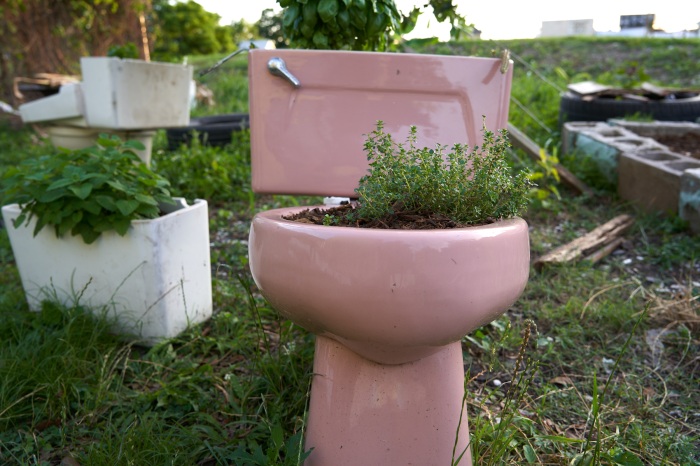
“I like gardening, to watch stuff actually come out of the ground and see that it’s food that you can actually eat,” Cyril Borden said. “I just got inspired by seeing it. … I noticed that you can watch the plants come out and be something special. Like my cucumber plants that you see right there. Them plants was just babies, like, two weeks ago, and now you already see they just like, wow. That’s what I like gardening for, to watch things grow. You know, to learn new things, too, I don’t want to be stuck in just one area and I just want to learn new thing. I done been a lot of places. Gardening is a new thing, a new hobby for me. (I started gardening) three weeks ago, and I’m seeing progress in my garden daily.
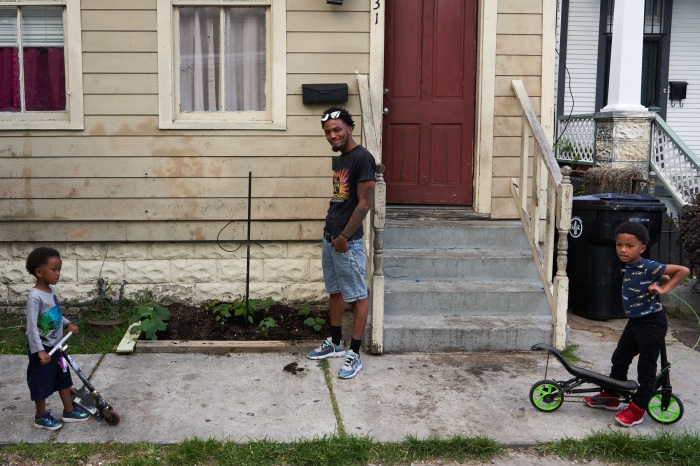
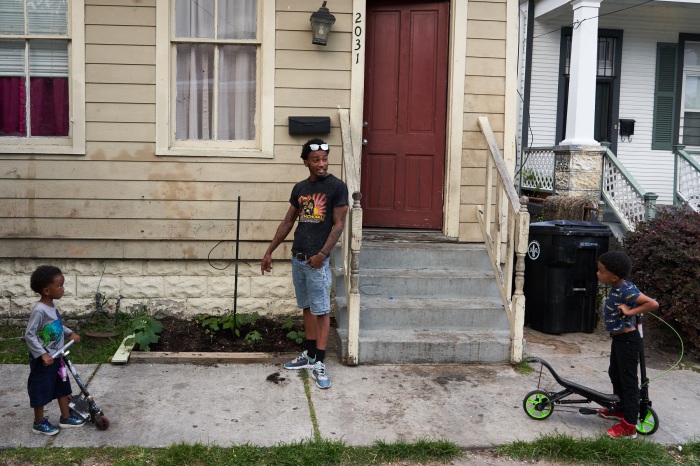
“It’s very important to learn how to grow food. That right there is the motivation, is because you may not always have a store. Things grow out, you’d be surprised, like, I would convince anyone to start a new hobby, and gardening would be it.
“I started this with my sons. I let them water the plants, I let them see how they’re gonna be. I show them pictures on the computer of what they’ll be when they’re fully grown.”
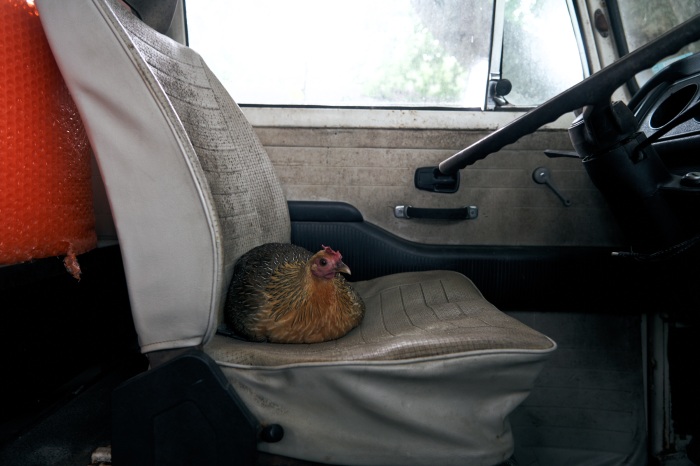
“I kept that going and it would get overrun. Like one year I planted arugula and it was just all arugula. I kept it going but I didn’t think of it as a food source. I’m a musician so suddenly my gigs were all getting canceled and I have no work in sight ‘til maybe next year, so I started thinking, gosh, this summer is going to be really hard. When Jazz Fest got canceled I was like, OK, I have nothing to live off through the summer, so I am going to take my garden really seriously.
“So we had already expanded it off the 4-by-4-foot, we had extended it another 8 feet, and then another year I had a bunch of compost, so I had built another box but I had never used it. And that is 4-foot by 8-foot. Then I expanded down this other side. I had this old bathtub that came out of the house when I was renovating and that became the herb garden. And then at the end I added another 4-by-4 section. I started planting more and I got addicted to it and I’m already harvesting and it’s awesome to be harvesting food from seeds, or from seedlings. I got some (seedlings) from Speak Easy Farm, and Green Light New Orleans supplied a few seedlings. I bartered for some of them, and my neighbor Chris gave me some, and I purchased a few.
“I’ll tell you, it is addicting. I always really wanted to have a garden but I never set aside the time for it. Now I’m kind of forced into it. I love it and can’t stay away from it. It’s really kind of low maintenance. I have to keep the chickens out and I might have to keep other birds out of it, so might put a net above it as well. But other than that it’s just fun to watch stuff grow, put some water on it and weed it every once in a while and there’s food, it’s really easy.”
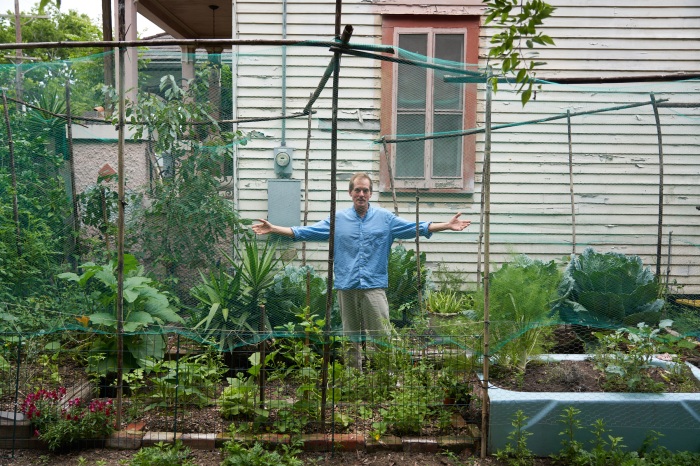
Shilling keeps chickens in his yard.
“One chicken kept coming in my back door and laying eggs in my bed. It was cute at first but then I was I like, I can’t let this go on, so I trained her to just go in the back hallway, so she comes in, I leave the bathroom window open. Actually this morning it was closed and I heard her pecking at the backdoor, like a dog scratching to get in, so I let her in and she’s got her little spot, I’ve got a fake egg there and she goes lays on it and lays another egg then flies out the window.
It’s great, she really has the best egg. I’ll eat those raw sometimes, still warm. I know some people get grossed out by that but I really love it. And then there’s another hen in the back hall sitting on her eggs, and there’s a couple in the van on their eggs.”
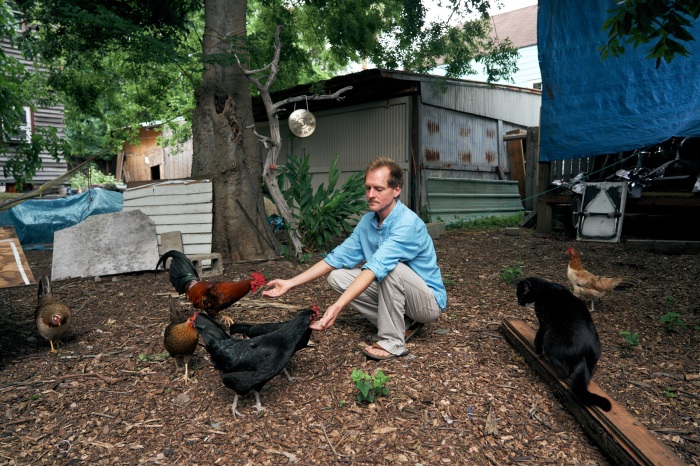

Thomas Durnford and Jay Anderson are in a band together. Since the COVID-19 lockdown, they started a business, named Voodoo Honey Botanicals, installing gardens.
Anderson said gardening is a family trait:
“My grandfather on my father’s side of the family was a pepper farmer, and he worked at a steel mill and also played the saxophone. And my grandmother on my mother’s side of the family always kept a garden.”
Anderson started gardening as a child, studied botany at UW Madison, and farmed after that until his business partner and mentor died of pancreatic cancer. After that, Anderson said, “I didn’t touch the soil for four years. This was the first year I wanted to start gardening again. It just so happened that when I wanted to start gardening again, COVID-19 happened. I went like four years of being incapable of touching the soil. When I put that first tomato plant in the ground, I thought about my mentor and burst into tears. … Then my bass player called me and said, ‘What are we gonna do to make money?’ And my band needs to make money and I’m their main source of income, and I said, ‘We’re gonna put down instruments and pick up shovels.’”

Durnford said their new gardening enterprise is “about us getting together and having a shared interest in self-reliance. I guess a key component now is that we need to figure out what we do besides music. We’ve been able to focus in on those things that we can do. Jay does plants incredibly well, and I really enjoy and have done a lot of woodworking, so I can show up and build beds quickly and he can put stuff in them then we’re playing off each other’s strengths.”
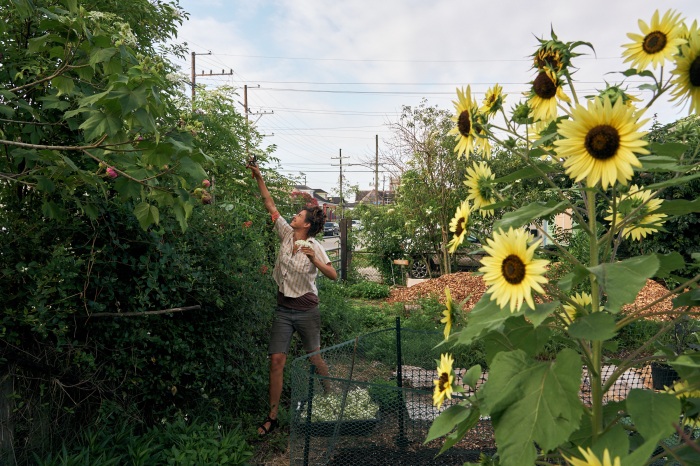
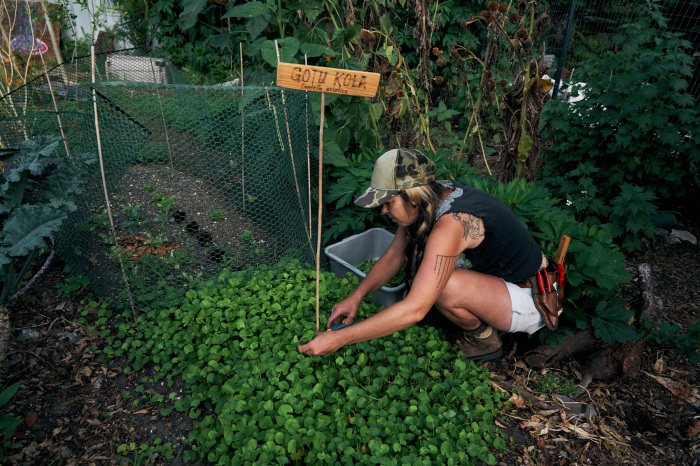
Eleanor Warner said that when the COVID-19 lockdown started, a lot of things changed for them.
“Well, a lot of things changed right away when the stay-at-home order was passed. I probably fielded five times as many phone calls and text messages and emails as I normally would, the interest in fresh food jumped instantly, and we felt pretty overwhelmed trying to respond thoughtfully to everyone but not get any larger than we are.
“We put in larger quantities of herbs that are supportive of any health consideration right now, both people that might be looking for things that seem like they’re related to flu symptoms and fever symptoms and that sort of thing, but then also people looking to have health needs met that are kind of disrupted by COVID-19. In some cases immune-boosting, in some cases stress-relieving or sleep-promoting, or things that are really vitamin-rich or mineral-rich. Yeah, it’s been really fun to learn about how potent so many of the plants you can grow here are, and how much people tend to describe benefiting from just having a closer relationship with the fresh plants that they might turn into something medicinal for themselves.
“Being able to have people come in and you-pick has been nice, too. We have to schedule it so we don’t have anyone overlap, but it has turned into a lot of nice appointments where folks have been able to come in and spend time with a bunch of living plants and then take some home and work with them in some kind of way.
“(Today) we are harvesting tulsi, which is a sort of basil relative, a cousin of the culinary basil we’re all familiar with, and tulsi makes really nice teas and tinctures and things, and gotu kola, which is a plant we’ve grown from seed here that support a lot of other things. It’s being taught in an herb class we’re supplying the herbs for. And peach leaf is the other one were harvesting today, and that gets used in particular in grief support formulas. Traditionally, you make a cup of peach leaf tea for your neighbor if they have somebody who has died. And it is very cooling. So those three things we’re harvesting for our friend Jen Stovall, who runs an herbalism introductory program. So for stay-at-home times, we’re harvesting what the class would use and putting it in individual packages, and the students pick those up and take them home and work with them.
“It’s a good time to connect with plants that can be supportive to you in whatever ways you’re seeking support. I guess as it feels like everything is turned upside down, the thing that has come through for me each day is that I can come work in this space with all these other species of living beings that have all of these different skills and all of these different adaptations that human beings have worked with for such a long time, and built such a good relationship with over time because they’re such good stewards of human health. That’s something that’s available to every person, even if it’s a potted plant on a stoop. A lot of our most common herbs are supporters of our health in pretty serious ways. Sage and thyme, oregano and mint are all really great herbs to work with that promote our natural immunity. Things like that are inspiring to me.”
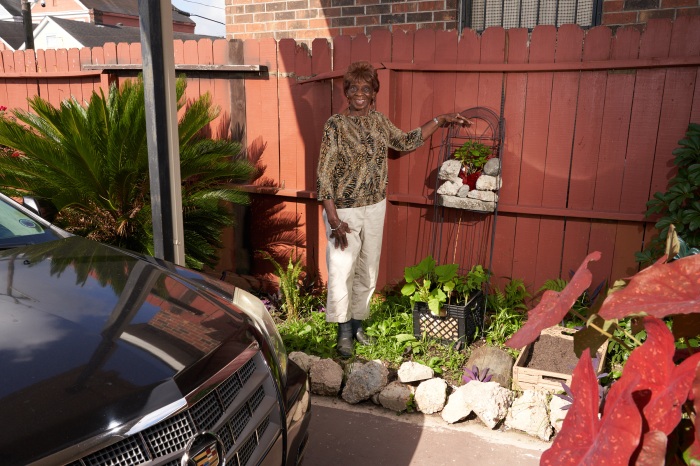
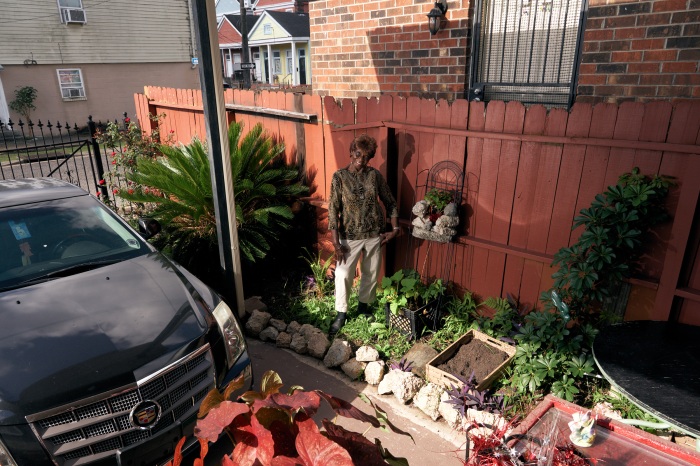
“I used to have plants, they would be artificial plants, then I decided with my daughter to get live plants. I told my daughter I’d like to have a garden and she said where are you going to put it? I said well, I’ll start out with it in boxes, and after the plants grow a little larger, I’ll put them down in my yard. She said, ‘A garden in the front yard?’ And I said, ‘Why not?’
“I don’t mind having a little garden in my front yard because if I can get enough okra, I can fry some okra and shrimps or put the okra in gumbos. And if I have peas I can put them in my salad. And I have zucchini, and I have watermelon. I just came in and planted that. … Can you see my little okra coming up? She (Jillian Welsh at Green Light New Orleans) just gave me two of them, and you see the little flowers on them, but the birds are coming in and taking some bites off my leaves, I look at them and they know they’re doing wrong, and they look at me like, ‘So what?’ And they just take a bite off my leaves. Take a picture of where they took a bite off my leaves. And I’m just sitting right out here and I tell them not to peck at the leaves and flowers but to just look at them, and they peck at them anyhow.
“I have a backyard, but it’s paved, just like this. I used to have a beautiful lawn, but you see, it takes people to keep it up, and I’m just getting older so I said well let’s just get on and pave everything. But now I’m sorry I did. I wish I didn’t have the pavement so I could just plant more vegetables. I love greens, and I wish I had mustard greens, collard greens and okra. I love that. I love corn too and sweet potatoes. One time I had sweet potatoes planted.”
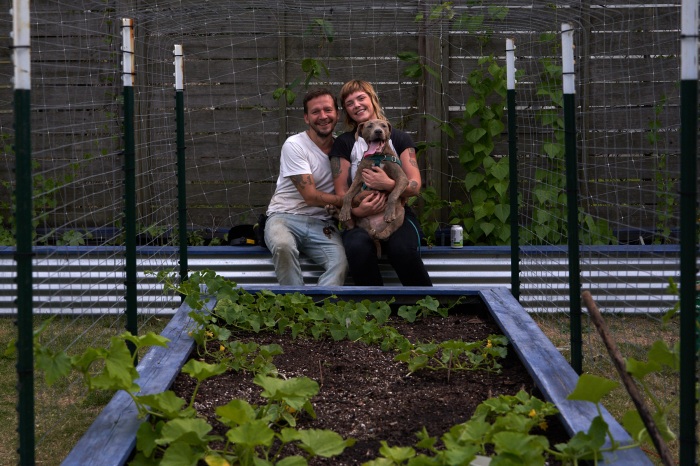
Carmen Maher said she started gardening with the “prompting of a few friends that are more interested in gardening. (We) are mostly focused on shortening the supply chain, both for food security and for environmental reasons, cutting down on packaging and shipping. I’ll also say being broke, being able to grow our own food looked especially attractive.”
O’Brien said gardening during the lockdown is building “community action in general, good community erupting, Facebook groups full of wholesome information and people being really kind.”
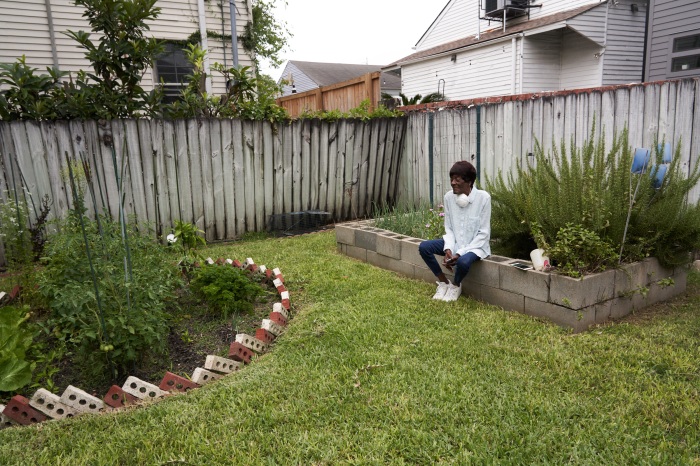
“For the past year I’ve had a little breathing problem, so I haven’t been able to work this up like I normally do, but I can do a little bit at a time, then I’ll rest up and start back again,” Jesse Taylor said.
“It’s a lot of fun. I like watching things grow. I actually ate tomatoes and bell peppers from back here last week. Actually, right now I got a tomato, I’ll probably cut it up for a salad. I have different stuff — bell peppers, peas, okra, mustard green, full of parsley. All the stuff is stronger than what you buy in the store, it’s more potent. And that’s about it. I like my green onions. My green onions are more potent than the ones you buy in the store — those have no taste to them. Green onions and my parsley, I’d more rather use my own, because I can get a taste from it when I cook.
“I’ll be back here more often now that I’m not going out. I used to live in the Magnolia Project and I used to like to plant stuff there, and I used to say, ‘If I ever get my own house, I’ll do me a little garden,’ which I did. I think I just always liked watching stuff grow.”
“I expanded just now because COVID happened,” Rush Jagoe said.
“So, all of a sudden we realized we were going on lockdown, and none of my neighbors or me had any work, and my landlord had all these garden beds he hadn’t been planting in the last few years, so it seemed pretty obvious to just approach the landlord and see if we could get some soil put in these beds and get a garden planted. I love eating okra.
“Right now there is a lot growing in this garden: two types of okra, both known for getting 5 or 6 inches long and staying tender; a lot of varieties of beans; quite a few of peppers; a lot of jalapeño; cayenne; shishito; because I love all of them. I wound up picking up a few other pepper starts from nurseries around town — New Mexico Big Jim, habanada, and I’ve got tomatillo, a bed of greens, collard greens, Lagos spinach. Got a lot of amaranth, cucumbers, lot of herbs, tons of basil, purple basil, tulsi, two types of Italian basil, pápalo, two types of oregano, two types of thyme. And then I’m aways just seeding radishes for ground cover until I get some mulch in this garden.
“I like growing food a lot, and I like growing food for people around me and with people around me. But I also really like growing flowers. In the past, I’ve enjoyed buying a lot of food from my friends who are farmers and growing herbs myself. With all of the uncertainty due to COVID, I wanted to plant a garden that could feed a lot of people.”
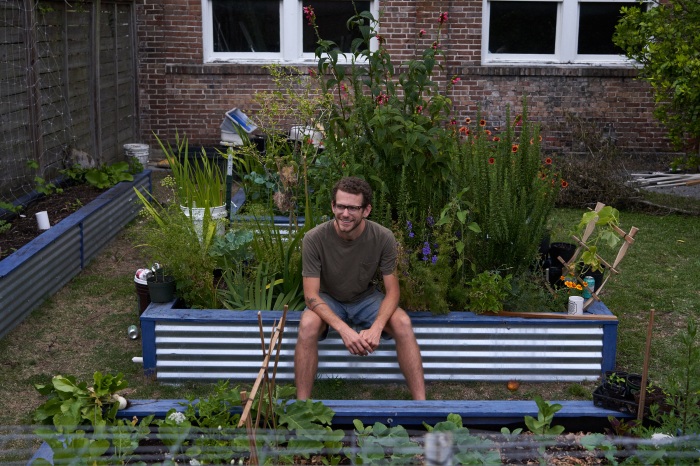
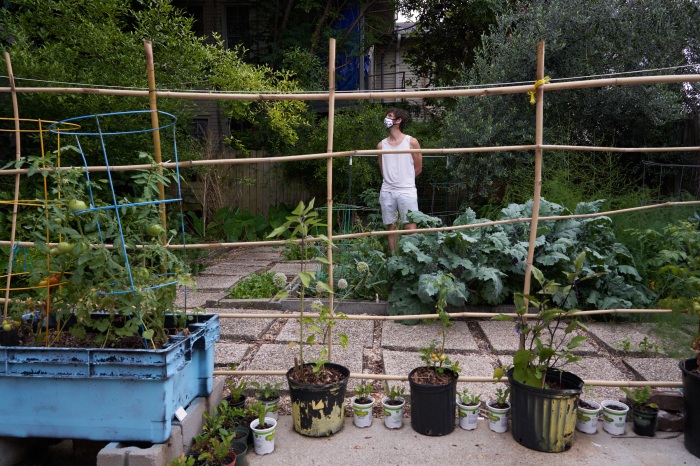
“I put this garden in when I moved here to this house in 2014, before I was real busy with work and school. But with the lockdown, I have a lot more time to have more intention. It’s really therapeutic. Every morning I make my coffee and come out here and check on everybody and take care of things as I can. I’m propagating a lot of my own seeds now, when before I would have gone and bought seedlings.
“I love it, especially for the greens. They go year-round and they’re expensive in the store, and these taste better. So everything that’s going now, the tomatoes and other things, are just icing on the cake.”
